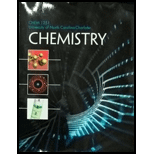
Concept explainers
Determine the masses of
Want to see the full answer?
Check out a sample textbook solution
Chapter 3 Solutions
CHEMISTRY >CUSTOM<
- The sugar sucrose, which is present in many fruits and vegetables, reacts in the presence of certain yeast enzymes to produce ethanol and carbon dioxide gas. Balance the following equation for this reaction of sucrose. C12H22O11(aq) + H2O(l) C2H5OH(aq) + CO2(g)arrow_forwardYou take 1.00 g of an aspirin tablet (a compound consisting solely of carbon, hydrogen, and oxygen), burn it in air, and collect 2.20 g CO2 and 0.400 g H2O. You know that the molar mass of aspirin is between 170 and 190 g/mol. Reacting 1 mole of salicylic acid with I mole of acetic anhydride (C4H6O3) gives you 1 mole of aspirin and 1 mole of acetic acid (C2H4O2). Use this information to determine the molecular formula of salicylic acid.arrow_forward4.108 Elemental analysis is sometimes carried out by combustion of the sample. For a hydrocarbon, the only products formed are CO2 and H2O. If a 1.36-g sample of an unknown hydrocarbon is burned and 2.21 g of H2O is produced along with 4.07 g of CO2, what is the empirical formula of the hydrocarbon?arrow_forward
- Tungsten (W) metal, which is used to make incandescent bulb filaments, is produced by the reaction WO3+3H23H2O+W How many grams of H2 are needed to produce 1.00 g of W?arrow_forward(a) Butane gas, C4H10, can burn completely in air [use O2(g) as the other reactant] to give carbon dioxide gas and water vapor. Write a balanced equation for this combustion reaction. (b) Write a balanced chemical equation for the complete combustion of C3H7BO3, a gasoline additive. The products of combustion are CO2(g), H2O(g), and B2O3(s).arrow_forwardNitric acid is produced commercially by the Ostwald process, represented by the following equations: 4NH3(g)+5O24NO(g)+6H2O(g)2NO(g)+O2(g)2NO2(g)3NO2(g)+H2O(l)2HNO3(aq)+NO(g) What mass of NH3 must be used to produce 1.0 106 kg HNO3 by the Ostwald process? Assume 100% yield in each reaction, and assume that the NO produced in the third step is not recycled.arrow_forward
- The molecular formula of acetylsalicylic acid (aspirin), one of the most commonly used pain relievers, is C9H8O4. a. Calculate the molar mass of aspirin. b. A typical aspirin tablet contains 500. mg C9H8O4. What amount (moles) of C9H8O4 molecules and what number of molecules of acetylsalicylic acid are in a 500.-mg tablet?arrow_forwardWhat mass of HCI, in grams, is required to react with 0.750 g of Al(OH)3? What mass of water, in grams, is produced? Al(OH)3(s) + 3 HCI(aq) AlCl3(aq) + 3 H2O(l)arrow_forwardCisplatin, Pt(NH3)2Cl2, a drug used in the treatment of cancer, can be made by the reaction of K2PtCl4 with ammonia, NH3. Besides cisplatin, the other product is KCl. (a) Write a balanced equation for this reaction. (b) To obtain 2.50 g cisplatin, calculate what masses (in grams) of K2PtCl4 and ammonia you need.arrow_forward
- How many grams of beryllium (Be) are needed to react completely with 45.0 g of nitrogen (N2) in the synthesisof Be3N2?arrow_forwardWhen heated, potassium chlorate, KClO3, melts and decomposes to potassium chloride and diatomic oxygen. (a) What is the theoretical yield of O2 from 3.75 g KClO3? (b) If 1.05 g of O2 is obtained, what is the percent yield?arrow_forward4.84 Aluminum chloride (AlCl3) is used as a catalyst in the production of polyisobutylene, which is used in automobile tires. Scrap aluminum metal reacts with chlorine gas (Cl2) to produce AlCl3. Suppose that 2.70 g of Al and 7.10 g of Cl2 are mixed. What is the maximum mass of AlCl3 that could be formed?arrow_forward
 Chemistry: Principles and PracticeChemistryISBN:9780534420123Author:Daniel L. Reger, Scott R. Goode, David W. Ball, Edward MercerPublisher:Cengage Learning
Chemistry: Principles and PracticeChemistryISBN:9780534420123Author:Daniel L. Reger, Scott R. Goode, David W. Ball, Edward MercerPublisher:Cengage Learning Chemistry for Engineering StudentsChemistryISBN:9781337398909Author:Lawrence S. Brown, Tom HolmePublisher:Cengage Learning
Chemistry for Engineering StudentsChemistryISBN:9781337398909Author:Lawrence S. Brown, Tom HolmePublisher:Cengage Learning Chemistry & Chemical ReactivityChemistryISBN:9781337399074Author:John C. Kotz, Paul M. Treichel, John Townsend, David TreichelPublisher:Cengage Learning
Chemistry & Chemical ReactivityChemistryISBN:9781337399074Author:John C. Kotz, Paul M. Treichel, John Townsend, David TreichelPublisher:Cengage Learning Chemistry & Chemical ReactivityChemistryISBN:9781133949640Author:John C. Kotz, Paul M. Treichel, John Townsend, David TreichelPublisher:Cengage Learning
Chemistry & Chemical ReactivityChemistryISBN:9781133949640Author:John C. Kotz, Paul M. Treichel, John Townsend, David TreichelPublisher:Cengage Learning Chemistry: The Molecular ScienceChemistryISBN:9781285199047Author:John W. Moore, Conrad L. StanitskiPublisher:Cengage Learning
Chemistry: The Molecular ScienceChemistryISBN:9781285199047Author:John W. Moore, Conrad L. StanitskiPublisher:Cengage Learning Chemistry: An Atoms First ApproachChemistryISBN:9781305079243Author:Steven S. Zumdahl, Susan A. ZumdahlPublisher:Cengage Learning
Chemistry: An Atoms First ApproachChemistryISBN:9781305079243Author:Steven S. Zumdahl, Susan A. ZumdahlPublisher:Cengage Learning





